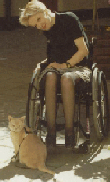I think I finally made the grade, I've become world's worst on empathy, by Susnnne Berg, June 2002

Don't mistake me - I've worked long and hard to get here. And I am satisfied that I finally succeeded. You see the empathy I've left behind me, is of the self-destructive kind.
Being a wheelchair user, and on the road to a disabled identity for more than 20 years now, I've encountered a multitude of attitudes in the not-responsible-for-the inaccessibility-to my-turf part of the population. The attitude most frequent (at least in Sweden) could be described as one of hurt innocence.
The scenario as follows:
An old workmate of mine which I haven't seen in a long time is currently working in an umbrella association for consumer issues. Said association moves to new office and by choice decides to have official opening before making the entrance accessible. Member organisation working for persons with mobility impairments gets pissed off, decides to leave umbrella and does so by announcing it publicly.
Everything could have ended here, if my former mate hadn't decided to interpret this as offensive and in a "personal letter" sent to me (among others) had lobbied for understanding. Or maybe that wasn't what he was after? His purpose frankly eludes me.
Anyway, this time I did understand. I finally understood that I, as one of the excluded, was asked to condone my own exclusion. And I didn't buy it! Exit old friend? Enter Susanne void of understanding, a bit hurt but frankly more amazed.
Thinking about it I realise that this has happened a thousand times before. I am always asked to condone, to understand, and to feel sorry for the persons behind my daily obstacle race. And I have played the game. I have put my own, and others right to participation on hold to soothe the hurt feelings of those benefiting from these obstacles; those having a good job, making a career, looking good, talking about the rights of disabled people from inaccessible podiums without microphones and teleloops in meetings announced in inaccessible ways in inaccessible formats etc.etc.
And at the same time I have pretended that I wasn't really Susanne. Oh, I was me - but only partly me. The part I left behind was the part they always pretended not to see, my mobility impairment. You see, this is what it's like to be when you're appreciated by the people with power. You are visible but never seen.
As a disabled person you bring credibility to the official "struggle" against disablement. At the same time you're expected to excuse the half-hearted measures and the lukewarm commitment; excuse it and condone the irresponsible, soothe their hurt feelings and pretend that it's really alright. It's not alright! You cannot talk about the importance of accessibility without demanding it - then and there. You have to point out to people that they are responsible. And it doesn't matter if they feel bad for excluding you. Let them! That's their privilege. They've earned it the hard way.
No more Ms Nice. From now on I will try to be me. Totally me! I will be Susanne with all my talents, acknowledging the disablement, never tolerant to it, always mirroring the responsibility back to the appropriate person. I will do my best to be totally visible or not at all. It will not be easy. Habit dies hard but I will do my best. You see, I finally understand the depth of this thing called disability pride.
by Susanne Berg. June 2002

